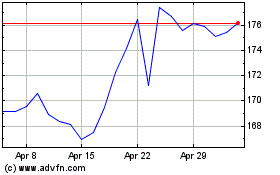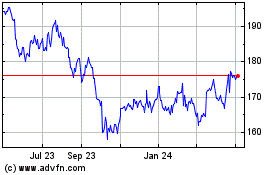PepsiCo Aims to Cut Emissions in Food Supply Chain With Regenerative Farming
April 20 2021 - 5:29AM
Dow Jones News
By Dieter Holger
PepsiCo Inc. is putting its weight behind so-called regenerative
farming in a bid to cut greenhouse gas emissions in its supply
chain, a challenge that more food-and-beverage companies have
recently been taking up.
The Purchase, N.Y.-based company said Tuesday that it plans to
spread regenerative farming--a nascent concept broadly aimed at
achieving sustainable agriculture--across 7 million acres of land,
roughly equal to its entire agricultural footprint.
PepsiCo said the effort will eliminate at least 3 million tons
of emissions by 2030 and involves expanding regenerative
agriculture across more than 500,000 acres of U.S. farmland by the
end of this year.
About 40% of the land in the U.S. is farmland, encompassing more
than 900 million acres, according to the U.S. Department of
Agriculture.
Food loss and waste accounts for 8% of the world's greenhouse
gas emissions, according to the United Nations, making sustainable
agriculture a key area of interest for companies looking to reduce
their environmental footprint.
The role of regenerative agriculture in combating climate change
isn't yet clear, and it remains a loosely defined concept. The
practice involves using plants to soak up carbon dioxide, which can
earn farmers valuable carbon credits, as well as lowering crops'
environmental footprint by cutting water and chemicals use, and
managing soil in a way that slashes emissions. PepsiCo said it
hopes a global standard around the method will eventually
materialize.
The company didn't disclose its dollar commitment to the
agricultural regeneration project but said it is tied to future
sustainability investments.
"Investing in this area is, of course, essential and helps our
business thrive in the long-term," said Jim Andrew, PepsiCo's chief
sustainability officer. "The principles of our ambition will be
fully integrated into our business and directly tied to all the
business decisions we make."
The plan isn't PepsiCo's first foray into sustainable
agriculture. Its Walkers snack brand in the U.K. has a "circular
potatoes" project that uses potato peelings to make low-carbon
fertilizer, which the company said can cut 70% of the carbon
emitted from growing potatoes.
PepsiCo is one of several U.S. companies setting their sights on
regenerative agriculture. Earlier this month, agrisciences company
Corteva Inc. said it will help more farmers move into the field. In
March, Keurig Dr Pepper Inc. said it would support regenerative
agriculture and conservation on 250,000 acres of land by 2030.
Crops aren't the only source of emissions in the supply chains
of food-and-beverage companies, which buy plastic and metal to
package their goods. To tackle that challenge, PepsiCo had said in
January that it aims to cut 40% of the emissions from its supply
chain--which are known as Scope 3 and contained in the products
companies sell--by 2030 from 2015 levels.
"We are committed to reducing emissions from our manufacturing
and supply chain, and regenerative agriculture helps us broaden the
ways we can capture carbon," Mr. Andrew said.
Write to Dieter Holger at dieter.holger@wsj.com;
@dieterholger
(END) Dow Jones Newswires
April 20, 2021 05:14 ET (09:14 GMT)
Copyright (c) 2021 Dow Jones & Company, Inc.
PepsiCo (NASDAQ:PEP)
Historical Stock Chart
From Mar 2024 to Apr 2024

PepsiCo (NASDAQ:PEP)
Historical Stock Chart
From Apr 2023 to Apr 2024
